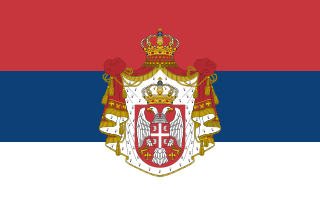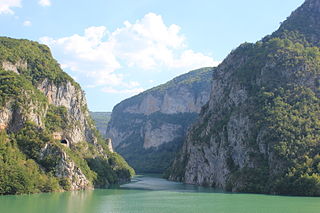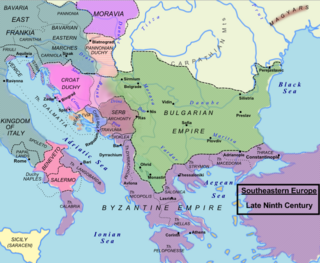Gostun may refer to:
- Gostun, a Bulgarian ruler
- Gostun, Bulgaria in Blagoevgrad Province, Bulgaria
- Gostun, Serbia in Serbia
- Gostuń in Poland
Gostun may refer to:
Bulgarian may refer to:

The Balkan Wars were a series of two conflicts that took place in the Balkan states in 1912 and 1913. In the First Balkan War, the four Balkan states of Greece, Serbia, Montenegro and Bulgaria declared war upon the Ottoman Empire and defeated it, in the process stripping the Ottomans of their European provinces, leaving only Eastern Thrace under Ottoman control. In the Second Balkan War, Bulgaria fought against the other four original combatants of the first war. It also faced an attack from Romania from the north. The Ottoman Empire lost the bulk of its territory in Europe. Although not involved as a combatant, Austria-Hungary became relatively weaker as a much enlarged Serbia pushed for union of the South Slavic peoples. The war set the stage for the July crisis of 1914 and thus served as a prelude to the First World War.

The Second Balkan War was a conflict that broke out when Bulgaria, dissatisfied with its share of the spoils of the First Balkan War, attacked its former allies, Serbia and Greece, on 16 (O.S.) / 29 (N.S.) June 1913. Serbian and Greek armies repulsed the Bulgarian offensive and counterattacked, entering Bulgaria. With Bulgaria also having previously engaged in territorial disputes with Romania and the bulk of Bulgarian forces engaged in the south, the prospect of an easy victory incited Romanian intervention against Bulgaria. The Ottoman Empire also took advantage of the situation to regain some lost territories from the previous war. When Romanian troops approached the capital Sofia, Bulgaria asked for an armistice, resulting in the Treaty of Bucharest, in which Bulgaria had to cede portions of its First Balkan War gains to Serbia, Greece and Romania. In the Treaty of Constantinople, it lost Adrianople to the Ottomans.

Kashkaval is a type of cheese made from the milk of cows, sheep, goats, or a mixture thereof. In Turkey, Albania, Bulgaria, Kosovo, North Macedonia, Romania and Serbia, the term is often used to refer to all yellow cheeses. In English-language menus in Bulgaria, kashkaval is translated as 'yellow cheese'.
Gostun was a regent over the Bulgars for 2 years.

The Kingdom of Serbia was a country located in the Balkans which was created when the ruler of the Principality of Serbia, Milan I, was proclaimed king in 1882. Since 1817, the Principality was ruled by the Obrenović dynasty. The Principality, under the suzerainty of the Ottoman Empire, de facto achieved full independence when the very last Ottoman troops left Belgrade in 1867. The Congress of Berlin in 1878 recognized the formal independence of the Principality of Serbia, and in its composition Nišava, Pirot, Toplica and Vranje districts entered the South part of Serbia.
Nova TV may refer to the following television channels:

The Lim or Vermosh River is a river that flows through Albania, Montenegro, Serbia and Bosnia and Herzegovina and is 219 km (136 mi) long. It is also the right and the longest tributary of the Drina.
Varna may refer to:

Macedonian nationalism is a general grouping of nationalist ideas and concepts among ethnic Macedonians that were first formed in the late 19th century among separatists seeking the autonomy of the region of Macedonia from the Ottoman Empire. The idea evolved during the early 20th century alongside the first expressions of ethnic nationalism among the Slavs of Macedonia. The separate Macedonian nation gained recognition during World War II when the Socialist Republic of Macedonia was created as part of Yugoslavia. Macedonian historiography has since established links between the ethnic Macedonians and various historical events and individual figures that occurred in and originated from Macedonia, which range from the Middle Ages up to the 20th century. Following the independence of the Republic of Macedonia in the late 20th century, issues of Macedonian national identity have become contested by the country's neighbours, as some adherents to aggressive Macedonian nationalism, called Macedonism, hold more extreme beliefs such as an unbroken continuity between ancient Macedonians, and modern ethnic Macedonians, and views connected to the irredentist concept of a United Macedonia, which involves territorial claims on a large portion of Greece and Bulgaria, along with smaller regions of Albania, Kosovo and Serbia.
Zlata is a female given name of South Slavic origin meaning "golden". It is common amongst all South Slavic countries in the Balkans, such as Bosnia and Herzegovina, Bulgaria, Croatia, North Macedonia and Serbia. The name is popular in Bosnia because it is considered ethnically neutral amongst the three dominant Bosnian ethnicities: Bosniaks, Serbs and Croats. The name is derived from the South Slavic word zlato - from the Old Slavic root zolto (gold).
Avramov is a Bulgarian and Serbian surname. Notable people with the surname include:

Gostun is a village (село) in southwestern Bulgaria, located in the Bansko Municipality of the Blagoevgrad Province. It is located on the eastern slopes of the Rhodope Mountains, east of Mesta river 17 kilometers southeast of Bansko, 54 kilometers southeast of Blagoevgrad and 103 kilometers southeast of Sofia.

Gostun Point is the ice-free point on the north coast of Snow Island in the South Shetland Islands, Antarctica situated 2.4 km west-northwest of Karposh Point, and 2.45 km east-southeast of Cape Timblón.
This is a list of people, places, and events related to the medieval Bulgarian Empires — the First Bulgarian Empire (681–1018), and the Second Bulgarian Empire (1185–1396).
Gostun is a village located in the municipality of Prijepolje, Serbia. As of 2011 census, the village has a population of 64 inhabitants. During the Second World War a detachment of Muslim militia was established in this village, under command of Selim Juković.

The Bulgarian-Serbian War of 839–842 was fought between the First Bulgarian Empire and the Serbian Principality. It was the first conflict of the medieval Bulgarian–Serbian Wars.

State Road 23, from Čačak via Zlatibor commonly known as Zlatibor Highway, is an IB-class road in central and western Serbia, connecting Pojate with Montenegro at Gostun. It is located in Šumadija and Western Serbia.
Greek Catholic or Byzantine Catholic Church may refer to:
The term Bulgarian-Serbian War or Serbian-Bulgarian War may refer to: